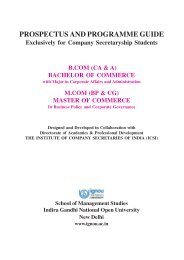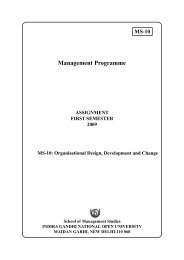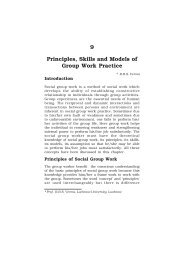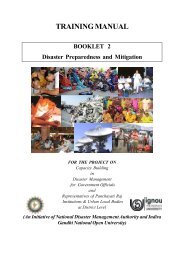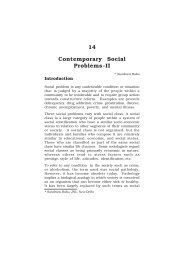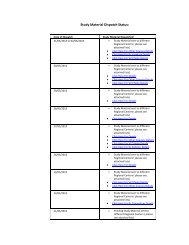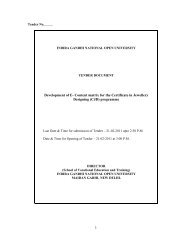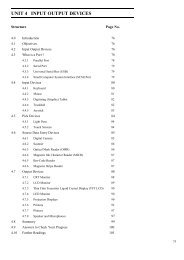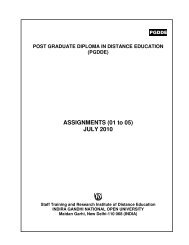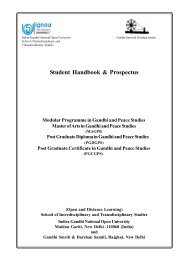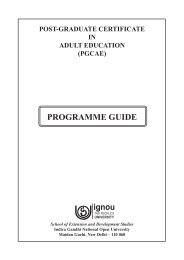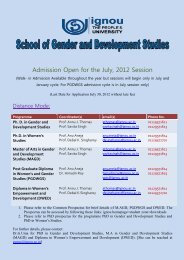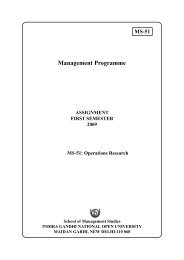PROSPECTUS AND PROGRAMME GUIDE - IGNOU
PROSPECTUS AND PROGRAMME GUIDE - IGNOU
PROSPECTUS AND PROGRAMME GUIDE - IGNOU
Create successful ePaper yourself
Turn your PDF publications into a flip-book with our unique Google optimized e-Paper software.
7. Various types of audit and their process<br />
Due Diligence audit; SOX Audit; Energy Audit - meaning & methodology; Productivity audit; Inventory audit;<br />
VAT Audit; Special audit under excise , service tax and customs records by cost accountant; Environment audit;<br />
Qualities of good certificate/report; Bank Audit and Concurrent Audit; Systems Audit; Audit under ERP<br />
environment.<br />
8. Fields for practicing cost accountants<br />
Statutory; Non Statutory; WTO regime; Assessment and quantification of losses under marine, fire & accident<br />
policies; ANTI-DUMPING - meaning, process, role of cost accountants.<br />
9. Professional Ethics<br />
Meaning of professional values and ethics; ICAI & IFAC guidelines for professional values and ethics; Ethical<br />
codes applicable to professional Accountants in India, Ethical code for Cost Accountants under Cost and Works<br />
Accountants Act, 1959 and The Cost and Works Accountants Regulations, 1959, as amended up to date.<br />
10. Auditing and Assurance standards<br />
Objectives<br />
Course 12<br />
MCO-028: Business Valuation Management<br />
To gain knowledge of the application of strategic business decisions into real life situations.<br />
Learning Aims<br />
●<br />
●<br />
●<br />
●<br />
apply technical knowledge in an analytical and practical manner;<br />
extract, from various subjects, the knowledge required to solve many-sided or complex problems;<br />
appreciate that there can be alternative solutions and understand the role of judgement in dealing with them;<br />
integrate diverse areas of knowledge and skills;<br />
Skill set required<br />
Level C: Requiring all six skill levels - knowledge, comprehension, application, analysis, synthesis, and evaluation<br />
1. Valuation Basis<br />
Principles and techniques of valuation; Asset valuation; Earnings valuation; Cash flow valuation; Other valuation<br />
basis; Efficient market hypothesis; Impact of changing capital structure on the market value of the company;<br />
Priorities of different stakeholders in terms of business valuation.<br />
2. Valuation of Mergers and Acquisitions<br />
Assets and cash flows; The strengths and weaknesses of various valuation method; Recognition of the interest<br />
of various stakeholders; Selection of appropriate cost of capital for valuation; Synergistic benefits; Forms of<br />
consideration and terms of acquisitions; Post merger integration process; Implications of regulations for business<br />
combinations; Types of exit strategies and their implications.<br />
3. Valuation of Assets and Liabilities<br />
Forms of intellectual property and methods of valuation; Valuation of fixed assets; Valuation of inventories;<br />
Valuation of investments; Valuation of shares; Dividend growth valuation models; MM theory; Valuation of<br />
options; Valuation of intangibles; Human resource accounting; Valuation of goodwill, patents and copyrights;<br />
Valuation of brands; Valuation of real estate; Relevant accounting standards.<br />
4. Case Studies<br />
A-52



